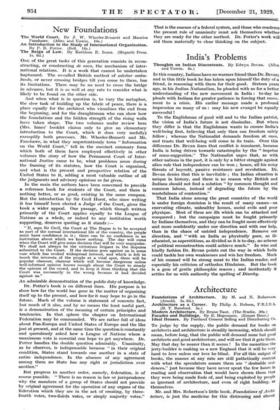New Foundations
The World Court. By J. W. Wheeler-Bennett and Maurice Fanshawe. (Allen and Unwin. 10s.)
The Reign of Law. By Kathleen E. Innes. (Hogarth Press. ls. 6d.) ONE of the great tasks of this generation consists in recon- structing, or constructing de novo, the mechanism of inter- national relations. It is a work that cannot be undertaken haphazard. The so-called British method of solvitur ambu- lando, or never crossing bridges till you come to them, has its limitations. There may be no need to cross the bridge in advance, but it is as well at any rate to consider what is likely to be found on the other side.
And when what is in question is, to vary the metaphor, the slow task of building up the fabric of peace, there is a place equally for the architect who visualizes the end from the beginning, and for the draughtsman who can show how the foundations and the hidden strength of the rising walls have taken shape. The two volumes under review here (Mrs. Inns' booklet claims only to give an elementary introduction to the Court, which it does very usefully) exemplify both processes. Mr. Wheeler-Bennett and Mr. Fanshawe, in what they unpretentiously term " Information on the World Court," tell in the succinct summary form which both of them have employed effectively in other volumes the story of how the Permanent Court of Inter- national Justice came to be, what problems arose during the framing of its statutes, how the Court is organized, and what is the present and prospective relation of the United States to it, adding a most valuable outline of all the judgments and advisory opinions so far given.
In the main the authors have been concerned to provide a reference book for students of the Court, and there is nothing better, or as good, existing in the same compass. But the introduction by Sir Cecil Hurst, who since writing it has himself been elected a Judge of the Court, gives the book a wider appeal. One passage, which though written primarily of the Court applies equally to the League of Nations as a whole, or indeed to any institution worth supporting, deserves quoting as it stands :— " If, says Sir Cecil, the Court at The Hague is to be accepted as part of the normal international life of the country, the people must have confidence in it ; there can be no confidence in an institution about which we know nothing. The day will come when the Court will give some decision that will be very unpopular. We shall not always be the victorious litigant in the disputes submitted to the Court. If the decision goes against us in some case whioh has evoked widespread interest, and which is felt to touch the interests of the people at a vital spot, there will be popular clamour, clamour which will become dangerous unless well-informed opinion knows enough about the Court to steady the opinion of the crowd, and to keep it from thinking that the Court was necessarily in the wrong because it had decided against us."
An admirable demonstration of the public duty of knowledge.
Dr. Potter's book is on different lines. His purpose is to show how far the world has gone in the matter of organizing itself up to the present, and how far it may hope to go in the future. Much of the volume is statement of concrete fact, but much of it also, and by no means the least useful part, is a demonstration of the meaning of certain principles and tendencies. In that sphere the chapter on International Federation may be commended. We are rather full of ideas about Pan-Europa and United States of Europe and the like just at present, and at the same time the question is constantly and querulously asked how a League of Nations where a unanimous vote is essential can hope to get anywhere. Dr. Potter handles the double question admirably. Unanimity, as he observes, is indispensable because " in their original condition, States stand towards one another in a state of entire independence. In the absence of any agreement among them no State has any right or jurisdiction over another."
But progress to another order, namely, federation, is of course possible. " There is no reason in law or jurisprudence why the members of a group of States should not provide by original agreement for the operation of any organs of the 'federation which they are in the act of creating, by three- fourth votes, two-lairds votes, or simply majority votes." That is the essence of a federal system, and those who condemn the present rule of unanimity must ask themselves whether they are ready for the other method. Dr. Potter's work will aid them materially to clear thinking on the subject.


































 Previous page
Previous page